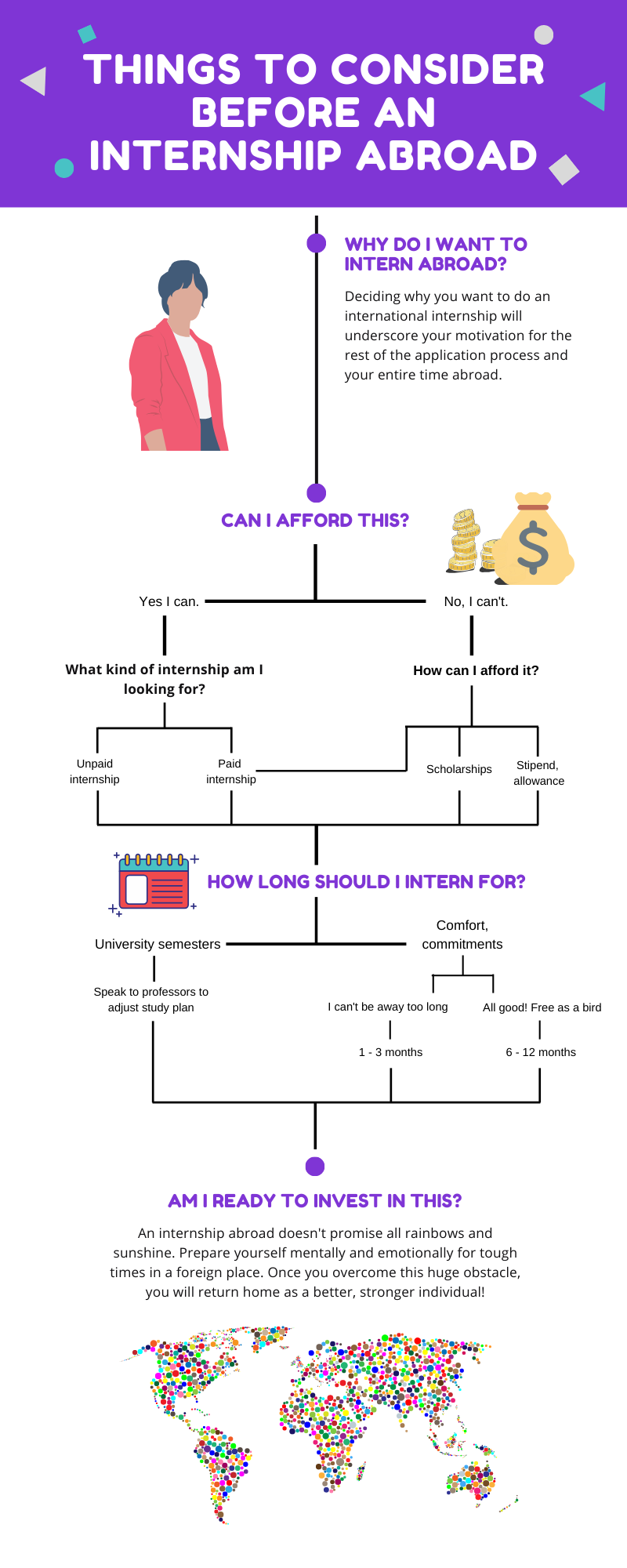
Picture this. Outside your window seat, you’re looking at the ocean, and the city buildings are getting bigger as your plane gets closer — you’re approaching the airport. This is going to be home for the next few months. You’re picturing the new faces you’re going to meet at the office, and how you’re going to introduce yourself (you’ve probably even prepared a speech). And your weekends? Oh, you’re going to be walking unfamiliar streets, sightseeing, and taking Instagram-worthy pictures to show your friends and family back home.
Is an internship abroad really as good as it sounds? The answer is a resounding, yes! Ask any of the people who have returned from working abroad, and they’ll tell you how amazing it is (in fact they probably won’t ever shut up about their experience. We are all guilty of this, including me!) However, after all our stories, one thing is clear, our time abroad has changed the way we see life. As amazing as it sounds to do an internship abroad, they’ll also tell you that it requires commitment, time, and proper planning. They’ve had to prepare themselves mentally, financially, and physically.
Thanks to insights coming from our fellow interns, we’ve gathered the five top things you should know before you do an internship abroad. Get ready for some introspection, because these are the questions you should ask yourself to see if you’re prepared and confident to face the realities of being abroad. Let’s begin!
1. “Why do I want to intern abroad?”
Let’s start with this. This is the most crucial question, as it will underscore the rest of your considerations. Thinking about the real reason you want to intern abroad can help you decide if it is right for you or you’re just wanting a couple of weeks vacation. An international internship is a great experience but it can also be hard work at times, so you need to decide how much you want to do an international internship before applying.
We asked our interns what motivated them to do their internship abroad. Some wanted to work and travel at the same time, while others wanted to leave their comfort zone. For some interns, it’s merely part of the university study plan to earn academic credit.
The process of applying for an international internship as well as a work permit or visa can be long and tedious with unexpected turns, but if you know why you want to do it, and you want it enough, then it will be worth it.
2. “Can I afford this?”
After you’ve answered the first question, the next crucial item on your checklist should be your finances. Money is a real issue that we have all had to consider. There are the flights, accommodation, costs for visa application, and your general expenses once you are there. The best way to prepare yourself is to research the prices, break them down, and see if you can afford the internship overall. By crunching the numbers this way, you manage your expectations, so it doesn’t overwhelm you.
“If I can’t afford it right now, what can I do?”
If you can’t afford to go abroad now, look for the next intake for the internship that fits in with your study plan at university. If it works out, use this time to raise funds for your internship. You can also look into scholarships for interns or university students. Taking out a loan is a feasible option, but only opt for this if they won’t hit you with a vast interest fee afterwards.
Check-in with friends or relatives who live in the city, and ask if you can stay under their roof and pay a small amount of rent. Find out if other students have done an internship in the same or city or look online for forums with student reviews of cities and the best accommodation. Once you know the company you will be interning with, reach out to them and see if they can give you advice on good cheap accommodation.
If you are going through a 3rd party international internship provider, always look to see what is included in the program fee as although one provider may be cheaper, if you have to source your accommodation separately it may end up being more expensive in the long run.
3. “Am I looking for a paid or unpaid internship?”
Your financial burdens can be significantly lightened by opting for a paid internship. Depending on the country, there are different laws about payments for interns, trainees, and working students. Although interns are not usually paid as much as full-time international employees, a small stipend or allowance can help tremendously. Remember that you should be valued as an employee of the company, rather than an overworked staff member who is paid a low salary or not at all. Some employers factor in shared accommodation or room rentals for interns and even provide a small meal allowance. Although not explicitly offered during the initial application phase, these allowances can be requested and negotiated if you ask politely and let the employer know that this would foster a more successful internship experience.
If you are okay with an unpaid internship, this will open up your choices even more. Non-profit organizations, social work centres, environmental institutions and other organizations without high-profiting business models usually don’t pay interns. But this also means that you can get a more meaningful experience by volunteering for a cause that you are passionate about.
4. “How long should I intern for?”
Two common factors determine how long our interns decide to spend abroad: university graduation and comfort.
This could be a question of how flexible your university is. If you are in the midst of your studies, speak to your program directors and professors, to find out how you can adjust your courses. Extending the time you’re away from university simply means that you will graduate just a little later than your peers. If graduating later is not a problem, then, by all means, go for a longer international internship. The cultural exposure and international work experience you get will be worth the time, as it will be a valuable asset for your future career.
Of course, if you are someone who gets homesick quickly, look for contracts that only last one to two months. For some of our interns, this could be their first time being apart from family and friends for an extended period. Some students also have family commitments which may hold them back.
Our advice is that internships should last at least three months to be meaningful. This will give you sufficient time to learn about your work, build a network at the office and adapt to the culture. Before you know it, your time will be up, and it will be time to head back home.
5. “Am I ready to invest in this?”
Mental and emotional preparation is just as critical. Many interns have gone abroad to a completely unfamiliar place where they don’t know anybody, the language, or the culture. They may feel alone and want to return home because they feel uncomfortable in a foreign country. Prepare yourself for tough times like these, and remember that once you overcome this huge obstacle, you will be a better, tougher person all around.
One of my favourite quotes is: “Be all in or get out. There is no halfway.” While you are on your internship abroad, stay open-minded. Opportunities and possibilities are going to come knocking at your door — it’s up to you to decide whether to take them or not, make the most of the limited amount of time you have. If you are struggling when abroad, take time to reflect on where you are, your experience so far and why you wanted to do an internship abroad, this may help you decide what are the best next steps and motivate yourself to continue.
Conclusion
Granted, there will be many things that you have to take into consideration before going on your internship abroad. But finding the answers to these five questions will help you decide if it is something you want to do and help you prepare as best as possible for it.
As you may already know, we here at Capital Placement, are big advocates for international internships. However, we do believe it is important to spend some time reflecting on why you want to intern abroad and what you are looking to gain from it. Don’t let these questions scare you away from applying but think of them as a checklist to make sure you are ready.
What are your reasons for wanting to do an internship abroad? Let us know below!



